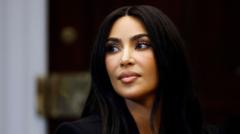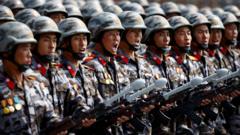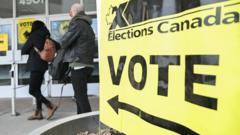The proposed talks, set for a security conference in Munich, highlight the complexities of diplomacy in the ongoing conflict, with Ukrainian leaders stressing the importance of their involvement.
**Trump Proposes Trilateral Talks in Munich Amid Ongoing Ukraine Conflict**

**Trump Proposes Trilateral Talks in Munich Amid Ongoing Ukraine Conflict**
President Trump announces a potential diplomatic meeting regarding the Ukraine war involving the US, Russia, and Ukraine, amidst skepticism from Ukrainian officials.
In a surprising announcement, President Donald Trump revealed that officials from the United States, Russia, and Ukraine will convene for discussions on the ongoing war in Ukraine during a security conference in Munich this Friday. "Russia is going to be there with our people," Trump stated, indicating that high-level representatives from all three nations would participate. However, Russia has officially declined to attend the annual forum in Germany, and Ukrainian officials have expressed skepticism about the talks, with one senior official stating that "talks with Russians in Munich" were "not expected."
The unexpected revelation follows Trump's separate conversations earlier this week with both Russian President Vladimir Putin and Ukrainian President Volodymyr Zelensky. Trump described these discussions as "great" and alluded to a "good possibility" of concluding the "horrible, very bloody war." However, he also noted that it is "not practical" for Ukraine to join NATO and deemed it "unlikely" that the country could regain its territorial integrity as it existed prior to Russia's annexation of Crimea in 2014.
Zelensky expressed his discontent with the idea that Trump had conversed with Putin before reaching out to him. He made it clear that Ukraine could not accept any peace proposal between the US and Russia that bypasses Kyiv. The Ukrainian leader emphasized the necessity of "security guarantees," highlighting concerns over a potential separate deal between the US and Russia that could compromise Ukraine's autonomy.
European leaders have echoed Zelensky's concerns, with French President Emmanuel Macron stating that only Ukraine has the right to negotiate its future with Russia. He warned that a deal perceived as a capitulation would have dire consequences for the region. EU foreign policy chief Kaja Kallas also warned against any "quick fix" solutions, echoing the sentiment that any resolution must fully involve Ukrainian representatives.
As Zelensky prepares for his meetings with US officials in Munich, including Trump’s Vice President, JD Vance, his main objective appears to be to secure continual US support and influence in negotiations. Conversely, the US administration's intentions remain less clear. Vance might aim to assure Zelensky that Ukraine will indeed participate in peace negotiations, despite worrying signs that Ukraine could be relegated to a lesser role.
The geopolitical complexities of this situation are underscored by the history of conflict in the region. Following the ousting of Ukraine's pro-Russian president in 2014, Russia annexed Crimea and supported separatists in eastern Ukraine, leading to a protracted conflict. With estimates of hundreds of thousands of casualties and millions displaced, the stakes are high for all parties involved.
As the world watches the developments from Munich, the prospects for a resolution remain uncertain, with significant implications for regional stability and international relations.
The unexpected revelation follows Trump's separate conversations earlier this week with both Russian President Vladimir Putin and Ukrainian President Volodymyr Zelensky. Trump described these discussions as "great" and alluded to a "good possibility" of concluding the "horrible, very bloody war." However, he also noted that it is "not practical" for Ukraine to join NATO and deemed it "unlikely" that the country could regain its territorial integrity as it existed prior to Russia's annexation of Crimea in 2014.
Zelensky expressed his discontent with the idea that Trump had conversed with Putin before reaching out to him. He made it clear that Ukraine could not accept any peace proposal between the US and Russia that bypasses Kyiv. The Ukrainian leader emphasized the necessity of "security guarantees," highlighting concerns over a potential separate deal between the US and Russia that could compromise Ukraine's autonomy.
European leaders have echoed Zelensky's concerns, with French President Emmanuel Macron stating that only Ukraine has the right to negotiate its future with Russia. He warned that a deal perceived as a capitulation would have dire consequences for the region. EU foreign policy chief Kaja Kallas also warned against any "quick fix" solutions, echoing the sentiment that any resolution must fully involve Ukrainian representatives.
As Zelensky prepares for his meetings with US officials in Munich, including Trump’s Vice President, JD Vance, his main objective appears to be to secure continual US support and influence in negotiations. Conversely, the US administration's intentions remain less clear. Vance might aim to assure Zelensky that Ukraine will indeed participate in peace negotiations, despite worrying signs that Ukraine could be relegated to a lesser role.
The geopolitical complexities of this situation are underscored by the history of conflict in the region. Following the ousting of Ukraine's pro-Russian president in 2014, Russia annexed Crimea and supported separatists in eastern Ukraine, leading to a protracted conflict. With estimates of hundreds of thousands of casualties and millions displaced, the stakes are high for all parties involved.
As the world watches the developments from Munich, the prospects for a resolution remain uncertain, with significant implications for regional stability and international relations.























